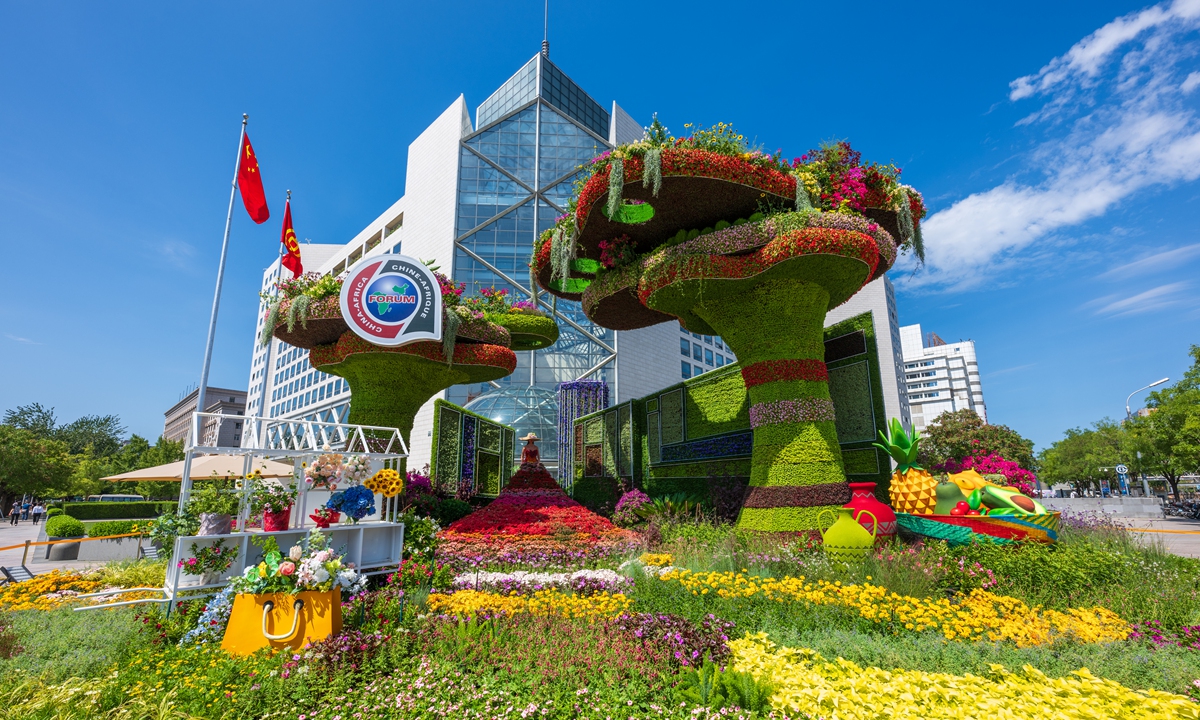On Monday alone, President Xi had bilateral meetings with leaders from African countries including South Africa, Guinea, Eritrea, Seychelles, Djibouti, Togo, Comoros, Mali and the Democratic Republic of the Congo (DRC), according to the Xinhua News Agency.
Over the years, the solidarity and cooperation between China, the largest developing country, and Africa, the continent with the most developing countries, have continued to benefit the nations involved, setting an example for how Global South countries can unite to foster common growth and sustainable development.
The high level of mutual trust, as well as the fruitful cooperation between China and Africa, are related to the traditional friendship, as China and African countries share historical experiences of suffering imperialist invasion, a common need for social and economic development, and similar perspectives and demands regarding the international order and global governance, experts said, adding that these are the reasons why both sides have always understood and respected each other.
During his meeting with South African President Cyril Ramaphosa on Monday, Xi said China will open its door wider to African countries, adding that the country stands ready to work with South Africa and other African countries to create new momentum for cooperation and promote high-quality development of China-Africa cooperation, Xinhua reported.
The more complex the international situation becomes, the more the Global South countries must uphold independence, strengthen unity and cooperation, and jointly safeguard international fairness and justice, Xi said.
Munetsi Madakufamba, executive director of the Zimbabwe-based Southern African Research and Documentation Center, told the Global Times that “The development approach and cooperation between China and Africa are a win-win partnership, emphasizing the importance of understanding each other’s context, circumstances, and development priorities. If you look at the development experience of Africa and in terms of cooperation with the West, it has been a kind of relationship of one side exploiting the other, which is unbalanced development.”
Unlike Western powers that often interfere in the internal affairs of African countries, China proposes a “five-no” approach to cooperation with African countries: no interference in their pursuit of development paths that fit their national conditions, no interference in their internal affairs, no imposition of will, no attachment of political strings to assistance, and no seeking of selfish political gains in investment and financing cooperation.
Advance modernization
According to the announcement by the Chinese Foreign Ministry, the theme of the 2024 FOCAC Summit is “Joining Hands to Advance Modernization and Build a High-Level China-Africa Community with a Shared Future.”
During his meeting with DRC President Felix Tshisekedi on Monday, Xi stressed that “at the upcoming FOCAC summit, China and Africa will announce a new positioning of China-Africa relations and a series of major measures for jointly advancing modernization, thereby drawing a new blueprint for China-Africa relations,” the Xinhua News Agency reported.
Analysts from China and Africa reached by the Global Times said that the remarks by the Chinese president at the upcoming FOCAC Summit will attract global attention and send a new message on China-Africa ties, and will keep guiding the way for China-Africa cooperation to withstand the challenges and to seek opportunities in a turbulent world.
The COVID-19 pandemic, along with pending global hot spot issues, brought brand new variables to the world, and further exposed the conflict between multilateralism and unilateralism, and the unprecedented and profound challenges faced by the global governance system, said Joseph Olivier Mendo’o, a scholar from Cameroon and executive director of the international exchange department of the China Africa Business Council.
“China-Africa cooperation is setting a model not only for South-South cooperation, but also for the world’s development and cooperation at large” in a world beset by turbulence and profound change, said the scholar.
According to an old saying in Chinese, “it is always better to teach a hungry person to fish than to give him a fish,” Li Haidong, a professor from the China Foreign Affairs University, told the Global Times. “And this is why China attached great importance to cooperation with Africa on vocational training and inter-governmental exchange on governance, which allows African countries to not just rely on major economies from outside, but also to become mature economic entities and markets in the global industrial chain,” he said.
Inspiring partners
In his meeting with Malian President Assimi Goita on Monday, Xi said China has consistently supported African people’s right to independently determine their future, and is willing to work with Mali and other African countries to support each other in pursuing modernization paths suited to their national conditions.
Goita said Mali appreciates China’s efforts and contributions in promoting regional and global peace and development and looks forward to closer multilateral coordination with China.
As a partner that advances modernization and industrialization with Africa, China has many unique advantages, which allows it to comprehensively participate in and even become a part of Africa’s industrialization, said Mendo’o.
“China is an inspiring partner in African countries’ poverty reduction efforts,” and hence “many African countries have shown an interest in adapting China’s experience to their national context,” he said.
“China is an important source of machinery and tech transfer (inbound trade) for African countries,” Mendo’o noted.
“When Africa achieves real modernization and industrialization, it will lead to a better world. This transformation will benefit everyone globally, as it will bring balance across the planet,” Madakufamba said.













